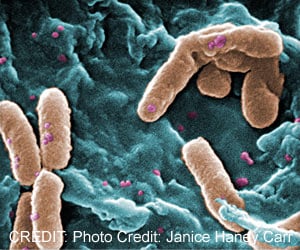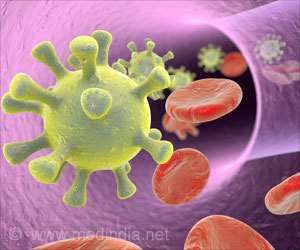Study published in Scientific Reports unveils success of bacteriophage cocktail against antibiotic-resistant Klebsiella pneumoniae biofilms on medical equipment.
- Bacteriophages effectively target and disrupt Klebsiella pneumoniae biofilms
- Phage cocktail reduces phage-resistant forms, bolstering its efficacy
- Potential for combined phage-antibiotic treatment in eradicating biofilms
Klebsiella pneumoniae is associated with various illnesses such as pneumonia, urogenital infections, liver abscess, and bloodstream infections. It poses a significant threat to hospital patients, potentially leading to conditions like ventilator-associated pneumonia or intensive care unit-acquired pneumonia. The emergence of drug-resistant and highly virulent strains, along with their ability to form biofilms on medical equipment, complicates the use of antibiotics in treating such infections. Therefore, employing bacteriophages to combat Klebsiella pneumoniae biofilms appears to be a promising option (1✔ ✔Trusted Source
Bacteriophages of Klebsiella spp., their diversity and potential therapeutic uses
Go to source).
The current study evaluated the effectiveness of previously identified depolymerase-encoding bacteriophages against biofilms produced by Klebsiella pneumoniae. In laboratory settings, a mixture of three bacteriophages exhibiting depolymerase activity successfully controlled antibiotic-resistant Klebsiella pneumoniae biofilms. These bacteriophages, namely vB_KpnM_FZ14, vB_KpnS_FZ10, and vB_KpnP12, were sourced from sewage water and had been previously assessed in larger phage cocktails in vivo.
Previous work utilized three-dimensional Cell Explorer microscopy to conduct real-time in vitro analysis of the lysis of a specific Klebsiella pneumoniae strain (Kl 315) using a combination of selected phages. The Kl 315 strain, known for its resistance to multiple drugs, was chosen for the bacteriophage efficiency study. Before inclusion in the study, the Kl 315 bacterial strain was isolated from a pneumonia patient and subjected to various tests, including mass spectrometry, biochemical analyses, and susceptibility tests to antibiotics according to standardized protocols.
To evaluate the characteristics of the phages used in this study, the Kl 315 bacterial strain was cultured on Brain Heart Infusion (BHI) agar for 18 hours to assess biofilm formation. Following 24 hours of biofilm growth with Kl 315, a phage cocktail containing 1.0 x 107 plaque-forming units (PFU) per ml of each bacteriophage or only the vB_KpnP_FZ12 phage was incubated at room temperature for 24 to 48 hours.
The Battle: Bacteriophages Vs. Klebsiella Pneumonia
The study compared the effectiveness of a single phage versus the combination of three phages in removing biofilms. Biofilms were analyzed using optical and scanning electron microscopy. The vB_KpnP_FZ12 phage, which exhibited the highest efficacy on Kl 315, was selected for this assessment.The titers produced by phage growth in the liquid medium indicated successful inhibition of Klebsiella pneumoniae cultures, with sufficient viral production to achieve high concentrations for final culture analysis. In vitro bacteriophage lysis demonstrated the ability of the selected bacteriophage cocktail to lyse planktonic cells of the K. pneumoniae Kl 315 strain and eliminate small microcolonies adhering to the glass surface.
The antibiofilm activities of the bacteriophage cocktail and the vB_KpnP_FZ12 phage were comparable, as confirmed by scanning electron microscopy. The results indicated that both single-phage and three-phage combinations with depolymerase activity were effective in controlling antibiotic-resistant K. pneumoniae biofilms.
While complete lysis of K. pneumoniae was not achieved, it is acknowledged that achieving lysis with bacteriophage is challenging due to the existence of complex pathways regulating bacterial lysis, including hibernation, quorum sensing, and transient resistance.
The study's conclusions underscored the effectiveness of the bacteriophage cocktail in disrupting Klebsiella pneumoniae biofilms. Despite the comparable effectiveness of a single bacteriophage and the triple-bacteriophage cocktail in disrupting biofilms, the use of combinations of bacteriophages is recommended for therapeutic purposes. This approach helps to mitigate the development of phage resistance and enhance bacteriolytic effects by broadening the range of phage hosts and expanding the target pathogen spectrum.
Early Treatment of Medical Devices with Bacteriophage can Eradicate Klebsiella Colonization
The findings highlight the potential application of the selected phage cocktail in the early-stage treatment of various medical devices to prevent biofilm formation. In cases where complete eradication of biofilms and bacterial colonization is necessary, combined phage-antibiotic treatment may be a viable option.“In the world of microbiology, the Phage-Cocktail emerges as a potent defender, showcasing nature's brilliance in the face of tenacious adversaries.”
Reference:
- Bacteriophages of Klebsiella spp., their diversity and potential therapeutic uses - (https://www.ncbi.nlm.nih.gov/pmc/articles/PMC7431098/)
Source-Medindia
















